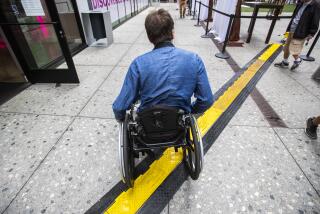Job discrimination bill to widen who’s covered
WASHINGTON — Millions of Americans with diseases or impairments such as diabetes, epilepsy, heart disease, cancer and carpal tunnel syndrome will be protected from job discrimination under a new disability rights measure set to become law this week.
The bill, five years in the making, won final passage in Congress last week, and President Bush said he would sign it.
The measure overturns a series of Supreme Court rulings that sharply limited who was covered by the Americans With Disabilities Act. When it was first passed in 1990, Congress said the anti-discrimination law protected anyone with a “physical or mental impairment” that “substantially limits” them.
But the high court interpreted the law to apply only to people who were truly disabled, not to those with common impairments such as a hearing loss or a medical condition that can be treated.
In 1999, the justices threw out a disability discrimination claim from a truck mechanic in Kansas who was fired because he had unusually high blood pressure. The court ruled that he did not have a disability because medication brought his blood pressure under control.
In another widely cited case, the court ruled in 2002 that an auto worker with carpal tunnel syndrome did not have a disability, even though she could no longer perform the repetitive tasks on the assembly line.
“Courts have created an absurd Catch-22 by allowing employers to say a person is ‘too disabled’ to do the job but not ‘disabled enough’ to be protected by the ADA,” a coalition of disability rights groups told Congress.
Over time, they won the backing of business groups, including the U.S. Chamber of Commerce, and that in turn led to quick passage of the bill.
In revising the law, Congress said the definition of a disability “shall be construed in favor of broad coverage of individuals under this act.”
“We are talking about millions of persons with medical conditions who can function well, but they often bump up against discrimination,” said Georgetown University law professor Chai R. Feldblum, who helped negotiate the bill. “This is not about giving someone a disability payment. This is a civil rights measure.”
Michael J. Eastman, a lawyer for the Chamber of Commerce, agreed that the courts had excluded too many people. “This means many more people will be deemed to have a disability, and some employers are nervous about that.”
He and other lawyers emphasize that the measure will not mean people who can show they have a disability will always win a discrimination claim. They still must show they are qualified to do the job. If an employee is deemed to have a disability, an employer must seek a “reasonable accommodation” that would permit him to work.
Nancy M. Zirkin, a longtime civil rights advocate, said it was remarkable that Republicans and Democrats came together to expand the reach of the disability rights law and that the resulting bill won unanimous approval in both houses.
“It’s a stunning achievement in this partisan atmosphere,” she said.
--
More to Read
Sign up for Essential California
The most important California stories and recommendations in your inbox every morning.
You may occasionally receive promotional content from the Los Angeles Times.











